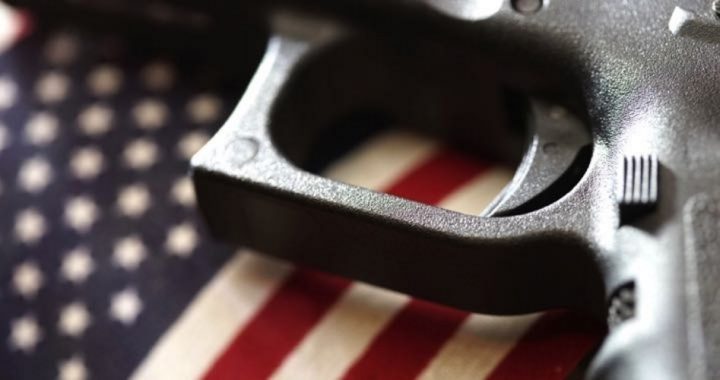
Podcast: Play in new window | Download ()
Subscribe: Android | RSS | More
Most supporters of the Second Amendment concentrate their focus on threats to their constitutionally protected right to keep and bear arms from within the federal government. But those who support the Second Amendment also should be aware that their own state governments might very well be coming after their guns, as well.
The latest gun confiscation efforts are based on the idea of taking guns away only from those who pose a threat to others or themselves. These laws are known as “red flag laws,” and while Americans who understand the importance of maintaining the Second Amendment should also be aware that if a state law stripped them of their rights and their guns, they would be just as stripped as if Congress acted.
With recent mass shootings receiving so much attention in the news, the number of state legislatures that have passed or are thinking of passing red flag laws is increasing. When the mass shooting took place in Parkland, Florida, at a local high school, only five states had red flag laws. Since then, 12 states and the District of Columbia have passed some version of a red flag law.
What is a red flag law?
In short, red flag laws are simply the latest in a long-standing effort to make the Second Amendment guarantee of an individual’s right to keep and bear arms meaningless — one step at a time. Red flag laws, sometimes called Extreme Risk Protection Orders, allow a judge to revoke a person’s right, or at least suspend their right, to own or possess a firearm, directing law-enforcement officers to take a person’s guns if family members or other people believe him to be a danger to himself or others.
Even President Donald Trump has vacillated on the idea of red flag laws, as have some Republicans who once cast themselves as staunch defenders of the Second Amendment. But while much of the drama is focused on D.C., most of the action — for now — is happening within the states.
In Ohio, for example, then-Governor John Kasich, a liberal Republican, made an effort to get such legislation passed in his state. His successor, Mike DeWine is a Republican who was believed to be much more conservative than Kasich. In fact, the Buckeye Firearms Association endorsed DeWine in his gubernatorial bid last year, giving him an A rating.
But with mass shootings receiving so much attention by the national media, it is not surprising that support to “do something” appears to be growing. Seventy percent in an APM Research Lab/Guns & America/Call To Mind poll conducted in August favored a red flag law that would let police initiate a confiscation order. Even gun owners, at 60 percent, and Republicans, at 67 percent, favored allowing family members to initiate such an order.
As such, Governor DeWine is wavering. This has brought him some praise from William Rosen, the managing director of state policy and government affairs at Everytown for Gun Safety (a group founded by gun confiscation advocate Michael Bloomberg, formerly the mayor of New York City). Rosen said, “It’s certainly encouraging that Gov. DeWine has endorsed policies, that there [are Republicans] signed on to co-sponsor the background checks law.”
But the Buckeye Firearms Association group’s executive director, Dean Rieck, vows to oppose DeWine signing the legislation, were the Ohio Legislature to pass such a law. “Our organization 100 percent opposes red flag laws because of the due process problem.” Rieck declared, adding, “The problem with the way all red flag laws to date have been structured is property is seized first and then the legal process happens afterward. This is the sort of thing that can be abused.” One might recall that Trump even indicated that he would favor taking the guns, then implementing the due process, before he later backed off that position.
Opponents of red flag laws argue that a family member could simply report a gun owner as threatening, just because they have had a falling out.
For now, even supporters of red flag laws in Ohio do not see “a tidal wave of change,” in the words of red flag supporter Peggy Lehner, a Republican state senator from near Dayton. Lehner, who is in her last term in the Ohio Senate, is not optimistic about the passage of a red flag law in Ohio. She blames the National Rifle Association (NRA).
“They [red flag laws] didn’t get done for the very same reason that this may not get done: The NRA is a very powerful lobbying group. I suspect that most of these folks who are not supporting this legislation would not say that it’s their NRA scorecard that they’re concerned about. But I believe it is.”
While those who are in favor of gun confiscation, at least some individuals, like to blame the NRA, it should be noted that if large numbers of citizens did not support the Second Amendment, it would not really matter what the NRA or any other lobbying organization did. Gun-control advocates like to cite polls, as though any of our constitutional rights should only exist at the sufferance of the majority, but then decry the lobbying efforts on behalf of the millions of Americans who value their constitutionally protected rights — rights that are under assault not only in the halls of Congress, but also across America in the state legislatures.
Steve Byas is a university instructor and author of History’s Greatest Libels. He may be contacted at [email protected]



